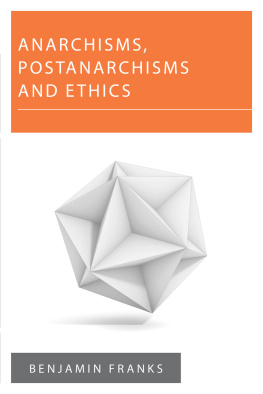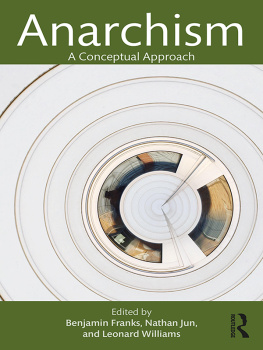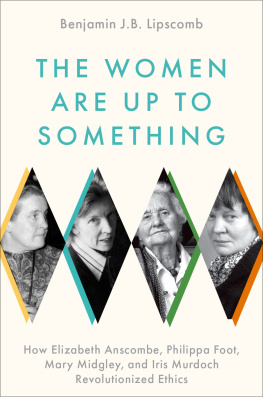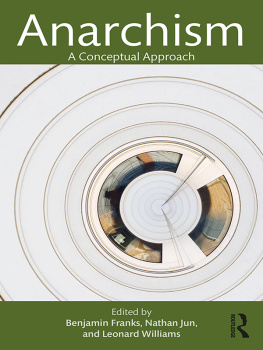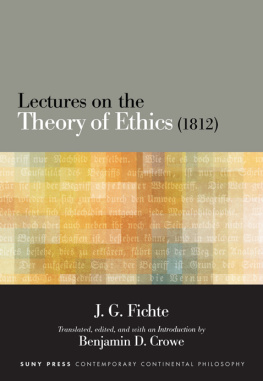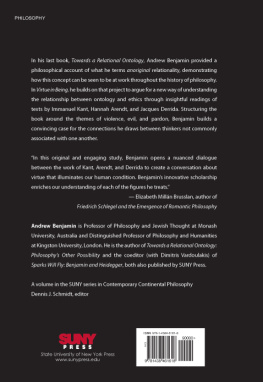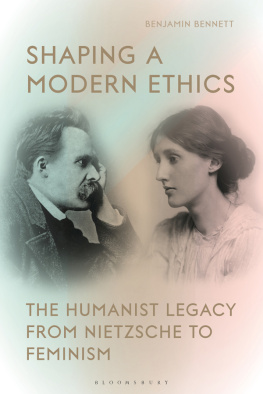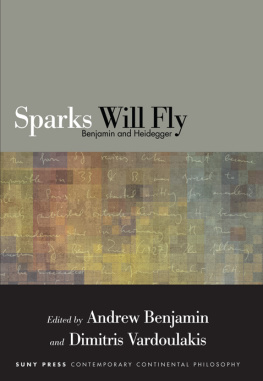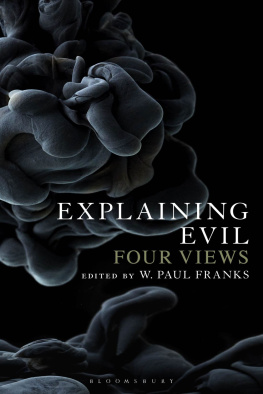Anarchisms, Postanarchisms and Ethics
New Politics of Autonomy
Series Editors:
Saul Newman and Martina Tazzioli
In recent years, we have witnessed an unprecedented emergence of new forms of radical politicsfrom Tahrir Square, Gezi Park and the global Occupy movement to WikiLeaks and hacktivism. What is striking about such movements is their rejection of leadership structures and the absence of political demands and agendas. Instead, their originality lies in the autonomous forms of political life they engender.
The New Politics of Autonomy book series is an attempt to make sense of this new terrain of anti-political politics, and to develop an alternative conceptual and theoretical arsenal for thinking the politics of autonomy. The series investigates political, economic and ethical questions raised by this new paradigm of autonomy. It brings together authors and researchers who are engaged, in various ways, with understanding contemporary radical political movements and who approach the theme of autonomy from different perspectives: political theory, philosophy, ethics, literature and art, psychoanalytic theory, political economy, and political history.
Titles in the Series
Spaces of Governmentality: Autonomous Migration and the Arab Uprisings
Martina Tazzioli
The Composition of Movements to Come: Aesthetics and Cultural Labour After the Avant-Garde
Stevphen Shukaitis
Foucault and the Making of Subjects
Edited by Laura Cremonesi, Orazio Irrera, Daniele Lorenzini and Martina Tazzioli
Italian Critical Thought: Genealogies and Categories
Edited by Dario Gentili, Elettra Stimilli and Glenda Garelli
In the Marxian Workshops: Producing Subjects
Sandro Mezzadra
Anarchisms, Postanarchisms and Ethics
Benjamin Franks
Anarchisms, Postanarchisms and Ethics
Benjamin Franks
Published by Rowman & Littlefield International Ltd.
6 Tinworth Street, London, SE11 5AL, UK
www.rowmaninternational.com
Rowman & Littlefield International Ltd. is an affiliate of Rowman & Littlefield
4501 Forbes Boulevard, Suite 200, Lanham, Maryland 20706, USA
With additional offices in Boulder, New York, Toronto (Canada), and Plymouth (UK)
www.rowman.com
Copyright 2020 by Benjamin Franks
All rights reserved. No part of this book may be reproduced in any form or by any electronic or mechanical means, including information storage and retrieval systems, without written permission from the publisher, except by a reviewer who may quote passages in a review.
British Library Cataloguing-in-Publication Data
A catalogue record for this book is available from the British Library
ISBN:HB 978-1-78348-829-2
PB 978-1-78348-830-8
Library of Congress Cataloging-in-Publication Data
Library of Congress Control Number: 2019951791

The paper used in this publication meets the minimum requirements of American National Standard for Information SciencesPermanence of Paper for Printed Library Materials, ANSI/NISO Z39.48-1992.
To Lesley Stevenson, Euan, Ronan and Samuel Franks
And my mum, dad and sister
With love
Contents
Introduction
Reader, what you are holding in your hands is, without doubt, the most important book that has ever been, or will ever have been, written. So is the next book that Im paid to promote. Sacha T. Burnstormpersonal communication.
Many contemporary texts open with a declaration of their timeliness. Anarchist books are no different. John P. Clarks (2013) The Impossible Community situates his work within the imminent environmental crisis and the endemic harms of global poverty. He cites the sixth great extinction in the history of human life, a devastated biosphere and the everyday, structural inhumanity of a billion human beings in absolute poverty, suffering from chronic malnutrition and other ills. Clark posits anarchism as providing the methods to resolve these problems: We have long had an answer. Laura Portwood-Stacer (2013) similarly starts with reflection on recent activist responses to patriarchy and capitalism. Saul Newman (2016, vi-vii) begins with the economic crash, and the apparent bleakness of the current moment.i
Every book is of its time. The author builds on the labour of others and hopes that their tome will be similarly used by other writers and thus extend into the future, or, better still, like the Situationists,ii produce a book that undermines or destroys other texts, even if it is by the expedient of wrapping the cover in sandpaper. Anarchist texts, despite their subversive intentions, are, in this respect, no different: they are written for effect. No book is written to be unread. Very few volumes are produced to be forgotten. Almost all of them are.
This book too is shaped by its social context and its attempts at finding and shaping an audience, but by identifying and reflecting on some of the apparently axiomatic features of an academic book, it hopes to surpass some of its limitations. The book is written,1 as Saul Newman indicates, in the aftermath of the 2008 economic crash and collapse in confidence with the liberal political order. This is expressed through expanding populist nationalist sentiment in the United Kingdom and the United States and elsewhere across the world, manifesting itself in the United Kingdoms vote to leave the European Union, the election of Donald Trump as 45th President of the United States and the rising and sustained support for nationalist-populist policies either in anti-system parties or integrated into governing parties. Climate change and plastic pollution is causing ecological and social harms, as well as a range of political responses from increasing electoral support for Green parties, demands for ecological states of emergency, paternalistic civil disobedience and strikes by school students.
Elizabeth Vasilevas (2018) doctoral thesis on anarchist meta-ethics highlights the change in background for radically inclined researchers. In the first decade of the 21st century, when anarchist research, although very minor, was becoming a more regular occurrence within the academy, the background was the spectacular and in many ways popular anti-capitalist demonstrations and carnivals (see, for instance, Gordon 2005, 68; Newman 2007, 7; Pinta 2011, 1516f) with a definite sense of optimism. Now, argues Vasileva, the background is different: We are not winning. There is no we. At least in Europe, the activist/anarchist/radical social movement(s) seem stuck with the same arguments, same battles, and no substantial victories have been achieved without conceding even more substantial sacrifices.
In Scotland, where I reside, the difference between English and Scottish popular opinion on the maintenance of existing political and economic ties with the EU has led to debates on alternative nationalisms. Central debates concern the pros and cons of a Scottish social democratic separatism from the rest of the United Kingdom. Anarchists do not comfortably fit into the debates when the choice is between which capitalism (neoliberal or nationalist) or which form of state (declining chauvinist or social democratic). It is not necessarily inconsistent for anarchists to have a preference. Michael Bakunin (1984, 2005) and Pierre-Joseph Proudhon provide historical resources for anarchist engagements with the national question (see also Gordon 2018). The environmental threat is much more pressing and more consistent with core environmental themes of anarchism (see, for instance, Peter Kropotkin and lise Reclus). The International Panel on Climate Changes (2018) latest report is warning of substantive and devastating impacts due to climate damage with an underlying message of the need for substantial changes in dominant economic and political behaviours. There has been sustained interest in anarchism, inside and outside of academia, because of its practical engagements in environmental direct action, its wider anti-capitalist critiques and strategies, and its sustained unmediated responses to the reanimation of brute nationalism.

 The paper used in this publication meets the minimum requirements of American National Standard for Information SciencesPermanence of Paper for Printed Library Materials, ANSI/NISO Z39.48-1992.
The paper used in this publication meets the minimum requirements of American National Standard for Information SciencesPermanence of Paper for Printed Library Materials, ANSI/NISO Z39.48-1992.
